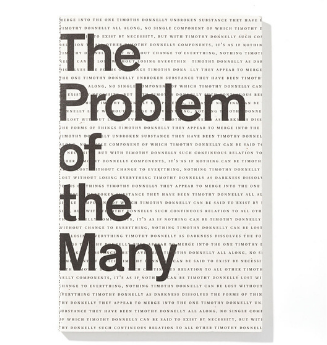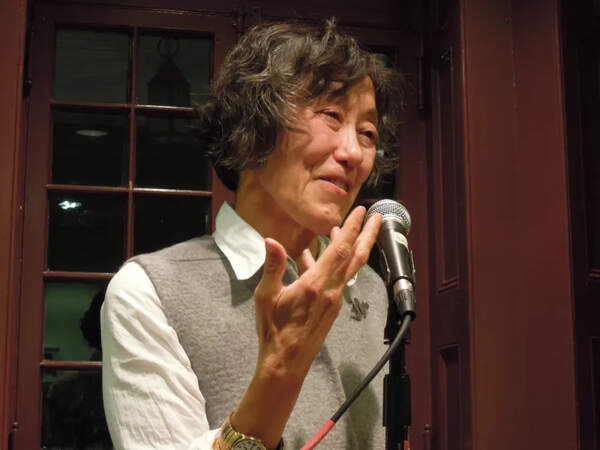Interviews
To Keep It All from Vanishing: An Interview with Timothy Donnelly

Timothy Donnelly’s third full collection of poems, The Problem of the Many, was released in 2019 from Wave Books. Having known and worked with Timothy since his second collection, The Cloud Corporation, was published to much acclaim in 2010, I was excited to learn about the process of a poet I considered to be among the most insistent and precise of his generation. Donnelly’s poems enact a kind of alchemy. The past, present, and future live together in his work. The language is revered, and it is exhaustive. He places high demands on his poems and his audience, but it is his faith in them, and us, that ultimately allows for transcendence. —Monica Fambrough

Monica Fambrough: The idea of borders is important in this book (the title itself referring to a philosophical problem, which is also a scientific problem, of defining any particle-based object whose boundaries are unclear)—I am interested in the formal implications here. All of the poems adhere to some fairly strict forms. What is your relationship to form when you write? Is it predetermined? What do you really think of it? In other words, in what way is it necessary, and how does it relate to the book's insistence on the dissolution of boundaries?
Timothy Donnelly: From the moment I read the title of Peter Unger’s essay “The Problem of the Many,” even before I had read the essay itself, I knew I had to name a book that. The phrase suggested a lot of things that matter to me as a distractable Gemini in our nation’s most populous city. But moreover, I liked how it seemed to reflect on its own polysemy, as if the manyness of its meanings was itself problematic—which I take to mean difficult to define or to determine; complicated, intricate, which to me, as writer, actually isn’t a problem at all, but an essential condition of art, as well as of consciousness. The phrase felt layered, varied, alive. Not unrelatedly, my interest in the borders that humans draw is informed, I think, both by an awareness of our need for them, as well as by a suspicion regarding how they are, to some degree, arbitrary, no matter how necessary or real they come to seem. They exist not for their own sake, but to serve some human need or appetite—beginning with basic cognition and self-preservation, but then also phobia, greed and so forth—and they are contingent on human perception. Other species might define us very differently than ourselves. Basically, I think my interest in borders is really just a constant awareness of how humans have come to organize the world and give it meaning, and while I’m weirdly moved by our need to do so, I’m also wary of our habit of mistaking the way we organize things, which is a kind of fiction, for the way things truly are. History is full of evidence not simply of how wrong we have been, but of how we have used our wrongness to support our avarice and ego and atrocity.
As for form, I’ve always been interested in patterning of all kinds, probably for a lot of reasons. I can’t account for every one of them, but on a primal level, underneath them all, as far as poems go, I’ve always felt that poetry’s ancient emphasis on the physical properties of language, and the use of certain of these properties (such as quantity or syllable count or stress) as leading principles in its composition, is what most distinguishes poetry from other kinds of writing, and what makes it most palpable, most present. The words aren’t there just to refer to what isn’t. That said, compared to most other poets throughout time, my own forms tend to be pretty flexible—if there’s often a strong sense of rhythm to what I do, I almost never write in actual meter; when I rhyme, it’s mostly loosely; and while there’s often a fair amount of assonance and consonance in what I write, for the most part, it’s instinctual, spontaneous (at least at this point). While I’m usually aware, in a way that feels as much bodily as mindful, of the effects of every line break, say, and of what it feels like for sense to be, as Milton says, “variously drawn out from one verse into another,” none of this is transpires in a way I would call predetermined, or even completely deliberate. I discover it as I write. There are exceptions, I think, mostly concerning my preference for larger-scale structural patterns like stanzaic regularity, which is something I typically get a feel for early in the composition of a poem and then adhere to. The sense of care and ceremony that this puts in a poem, the feeling of a framing and the focus it can bring, plus that pleasing estrangement from the workaday tongue, or from what Sidney calls “table-talk fashion” and “words as they chanceably fall from the mouth,” make all the difference to me.
Asked if this is all necessary, I would say no. Like the borders we draw, these formal determinations serve a need, or an interest, or a number of them, but they are ultimately arbitrary. I have maybe a hundred things to say about that, but I’ll try to limit myself to three. First, I believe, in a general way, that linear and stanzaic regularity evoke something like a centripetal force that counterbalances the poems’ amplitude and inclusiveness (which you bring up later), and adds a sense of structural sure-footedness to their wandering and uncertainty. Secondly, in addition to other formal properties referred to above, these regularities serve to foreground the artifice of the poem, reminding us that it isn’t so much an actual speech act in the world, but a made thing, an artefact. Thirdly, I still believe in the “poetical state,” that condition of mind in which meaningfulness emerges from the murk we live in, rehabilitating what habit deadens, and that to perpetuate this state is the most sacred responsibility of the poet, which is accomplished through the magical balance of order and chaos. To wrap up, I’ll admit that on first take it might seem that the poems’ formality is somewhat inconsonant with their spirit of inclusiveness and the will to surpass perceptual and conceptual boundaries, but for me, I call on form to “make a dwelling in the evening air,” a hall for all the voices to collect in and be heard, rather than to atomize, disperse—it’s like a church, as in my poem “Roof,” whose congregation says “we build a roof above our head / to limn the need to raise it.” In fact it’s just like that.
MF: Can you talk a little about poison and junk food? Both are recurring themes, and I am wondering if there is an explicit connection there. Not necessarily that junk food is poison, but perhaps that as people we may not be the best arbiters? There seems to be a fine line in this book, or maybe a dissolving boundary, between food and poison.
TD: I actually do think of junk food as poison and of all the chemically polluted foods of our age as toxic. So much of what we eat in America means taking on a little death for a little satiety or convenience or dumb pleasure. It all adds up, and corporations grow richer and continue to contaminate the planet and everything living on it. Let’s be honest. If I can’t imagine being wholly free of these hazards in this lifetime, I also don’t want to pretend it isn’t what it is. After decades of being relatively thoughtless about these things, I became far more conscious of the visible and less visible effects of how and what we eat after I became a parent.
MF: So much is included in the book, but a lot of it is lost to us: Aztecs, ancient Greeks, extinct wallabies. Or it is vanishing (“The Death of Truth,” “The Death of Print Culture”). Yet there isn’t all that much detail (relatively) from your actual, immediate life or current events. How do you decide what to include—do you ever say to yourself, “that is too personal,” or “that is too obscure”? Do you see yourself as performing a resurrection, or a preservation, and does that impact your choices?
TD: I think there’s probably more of my actual life in The Problem of the Many than might be immediately apparent, from some deeply personal moments to boring ordinary things like boarding an airplane or going grocery shopping or trying to take a decent photograph of lightning. But it’s true that my poems tend not to center on revisiting specific events from my life straightforwardly or exclusively, but do so either obliquely or in a style that doesn’t seem particularly realistic or overtly personal, with the exception of “The Death of the Author,” which I started writing more or less satirically, but then it went and got real. Otherwise, I might dip into my everyday personhood tangentially, or as one element among others. That said, for as long as I’ve been writing poetry, which I started doing in college, most new poems that I’ve come into contact with have had a recognizably human speaker, one that readers tend to identify as that of the poet appearing more or less in propria persona, maybe with the volume turned up or some other kind of tweaked. There’s a lot of fine work being made in that vein and always will be, and with varying degrees, and new kinds, of tweaking. And I myself am hardly insusceptible to it. Everything in the poem “All Through the War,” for example, is factual, although its structure is more montage than narrative. The virtues of the personal mode are undeniable—intimacy, urgency, and relatability, to start. Moreover, for the poet, it offers a chance to be heard, to speak one’s heart or on behalf of others, and I totally don’t dismiss the importance of that. But I also don’t want to feel encumbered by it.
Let me put it this way. I used to resist Elizabeth Bishop, but not through any fault of her own. It was because of my education in the 90s, which so often presented Bishop’s poetry as a marvel of “restraint, calm, and proportion.” The quote comes from Randall Jarrell. At the time, I just couldn't accept that this is what we wanted from poetry. That we would push ourselves through day after day, biting our tongues and averting our eyes, trying to keep an even keel no matter how exploited or unwell or deprived we might feel, and then when we at last sat down to write our poems, we would again aim for “restraint, calm, and proportion.” It made no sense to me that we should reduplicate in our poetry the same order of business we were forced to submit to “in reality.” Poetry, or art in general, seemed to me the place where we should be at liberty to unleash ourselves completely—to speak out, to speak back, to provoke, to strive, to seek out new life and new civilizations, and to comport ourselves not decorously, but with exuberance, intensity, defiance, and ecstasy. Not to avoid our reality altogether, not ever, but never to be a willing prisoner to it, either. Through the years I may have tempered a little, and have come to appreciate Bishop on my own terms. But there’s a reason I’m telling you this! Around the same time, starting when I was an undergraduate, a few teachers and several peers pretty much commanded me to write explicitly autobiographical poems on mundane topics in a measured tone. Let’s just say I had been doing other things. It was awful, but I gave in. It wasn’t at all what I wanted to make, and I wasn’t happy with it, but I did it.
And In the end, it helped. It expanded my range, and not just because it left me more confident when drawing from my personal past or present if it suited me or the poem, but also because I grew more comfortable with the tones and affects associated with what we call “sincerity.” Nonetheless, I didn’t then and I still don’t want to feel that I have to reproduce in my writing the same limits I am answerable to in the everyday, including those of my person. (I think this probably relates to what I was saying earlier about borders.) So, in my poetry, I am often myself, or approximately, but I am also sometimes plural, and always mutable; I have been a deer, a dog, an unborn bird, deceased, a tyrant, and nothing special. I have made popcorn in my microwave and built the Tower of Babel. I have impersonated Nebuchadnezzar (who himself wasn’t always himself), morphed into an alien, and was never not a time traveler, literally or figuratively, the way we all our in our heads. I have never felt anything couldn’t find its way into a poem, mine or anyone else’s, for any reason—although there are certain evils that call for utmost sensitivity and caution. At the same time, I don’t need to see poetry used as a platform to demonstrate how ethically fine one’s brand is any more than I need poems that lack evidence of exigency, effort, or passion. I’m not so much into the sound of the human being just dicking around. Lastly, thank you for asking about preservation. My editor Matthew Zapruder used the word “preservationist” to describe The Problem of the Many in his notes on the manuscript, and when I read it, it surprised me and made me cry. I had known all along that I wanted to write with a sense of the interconnectedness of all life, and with the awareness that, despite appearances, and despite our borders, everything that exists exists as one single continuous fabric, what Lucretius calls the textum. What I didn’t realize was how deeply I wanted to keep it all from vanishing.
MF: If you were not a poet, and barring the practical considerations of talent or income, what career would you pursue?
TD: I would be a chef or I would direct movies.
MF: These poems have a lot of modes and tones—they are often conversational, profound, precise, expansive, insistent, meandering, morose. There are moments, also, of great beauty. Would you say that you put the beauty there intentionally—and are you thinking of your audience when you do—or is it a natural byproduct of a poetry that seeks to be comprehensive?
TD: Thank you for this, too. I took part in a deep three-day conference in 2018 with a lot of excellent poets, and while moderating the final panel, out of nowhere I realized that not a single one of us had mentioned beauty all weekend long. There was much to say about a lot of other things, but beauty went unspoken. I’ll paraphrase now what I said then: No matter what else a poem might hope to be or do, if the possibility of beauty weren’t on the table, I wouldn’t be interested. I wouldn’t even want to live.
* * *
Monica Fambrough is the author of the poetry collection Softcover (Natural History Press) and a chapbook, Blue Transfer, forthcoming from Oversound in 2020. Her work has been published in The New York Times Magazine, anthologized by the Everyman series, and translated for release in Germany by Sukultur. She lives in Marietta, Georgia.
* * *
Author photo by Stella Donnelly.


